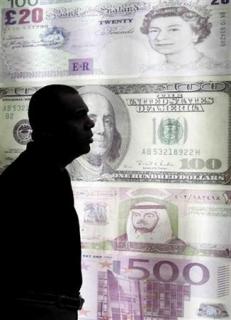Latest NEWS
- Aswat Masriya, the last word
- Roundup of Egypt's press headlines on March 15, 2017
- Roundup of Egypt's press headlines on March 14, 2017
- Former Egyptian President Hosni Mubarak to be released: lawyer
- Roundup of Egypt's press headlines on March 13, 2017
- Egypt's capital set to grow by half a million in 2017
- Egypt's wheat reserves to double with start of harvest -supply min
- Roundup of Egypt's press headlines on March 12, 2017
Standard and Poor's downgrades Egypt's outlook, expects growth supported by 'broad political stability'

A man walks past a currency exchange office in Cairo - Reuters/Mohamed AbdelGhany
CAIRO, Nov. 15 (Aswat Masriya) - American financial services company Standard & Poor's downgraded Egypt's outlook from "positive to stable," and expects a continued "gradual" economic recovery but also the persistence of "external imbalances".
Standard & Poor's said the outlook was revised to stable to reflect its expectation that Egypt will "largely remain politically stable" and that its economy "will continue to progressively grow in the face of important macroeconomic headwinds," it said in a press release on Friday.
Years of political turmoil have taken a toll on Egypt’s economy, halving the state’s foreign reserves and driving away tourists. Many fear that the Russian plane crash in the Sinai desert on Oct. 31 will further damage the tourism sector, which was a vital source of hard currency for the Egyptian state.
Standard & Poor's expects recovery in Egypt to depend on "maintaining security and sociopolitical stability, and addressing structural shortcomings in its energy and the foreign exchange markets."
The financial services company believes economic growth will be "supported by broad political stability" coupled with "policymakers' commitments to embark on a new round of economic and fiscal reforms."
It expects economic growth of an average of 4 percent over the next three years, which is closer to the International Monetary Fund's and World Bank's projections than it is to the Egyptian state's projection of 5 percent in the fiscal year 2015/2016.
Still a Gross Domestic Product (GDP) growth of 4.2 percent in 2015, as projected by Standard and Poor's does represent "a significant rebound from the average 2.1% recorded in 2011-2014."
Yet despite the expected acceleration in GDP growth, Standard and Poor's also expects fiscal debts and domestic ratios to be high in the period from 2015 to 2018. The financial services firm projects a deficit of 11.5% of the GDP in 2015, down from 12.8 in the fiscal year 2013/2014.
One of the earliest decisions President Abdel Fattah al-Sisi took after taking office was aimed at reducing spending, by reducing petroleum subsidies and introducing new taxes in July 2014, which hiked fuel prices by up to 78 percent. This was part of a government plan that aims to eventually lift fuel subsidies completely in the coming few years.
However Standard & Poor's does not expect Egypt to be able to continue to do so, stating it considers the Egyptian government's "ability to significantly cut spending as limited."
It adds that "gross external financing needs" will exceed "100% of the country's current account receipts and usable reserves in the next few years."
Gulf states, mainly Saudi Arabia, the United Arab Emirates and Kuwait have backed Egypt over the past two years and have put money behind their words, handing Egypt up to $25 billion in the form of loans, grants and petroleum products.
But fiscal pressures in the Gulf and reduced oil prices are weighing on Gulf economies, leading to dwindling aid to Egypt. Standard and Poor's expects assistance to Egypt to continue because of Egypt's "strategic" importance in the region but added that the fiscal pressures the Gulf is facing could affect this support.
The American firm kept Egypt's long- and short-term foreign and local currency sovereign credit ratings, which help investors assess the risk level of investing in a country, unchanged at "B-/B".










